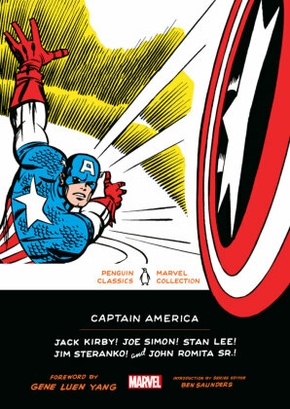
Captain America
| Verlag | Penguin Random House |
| Auflage | 2022 |
| Seiten | 400 |
| Format | 17,9 x 25,2 x 2,4 cm |
| Gewicht | 923 g |
| Artikeltyp | Englisches Buch |
| Reihe | Penguin Classics Marvel Collection 2 |
| EAN | 9780143135753 |
| Bestell-Nr | 14313575EA |
The Penguin Classics Marvel Collection presents the origin stories, seminal tales, and characters of the Marvel Universe to explore Marvel s transformative and timeless influence on an entire genre of fantasy.
A Penguin Classics Marvel Collection Edition
Collects Captain America Comics #1 (1941); the Captain America stories from Tales of Suspense #59, #63-68, #75-81, #92-95, #110-113 (1964-1969); Captain America Commie Smasher from Captain America #78 (1954). It is impossible to imagine American popular culture without Marvel Comics. For decades, Marvel has published groundbreaking visual narratives that sustain attention on multiple levels: as metaphors for the experience of difference and otherness; as meditations on the fluid nature of identity; and as high-water marks in the artistic tradition of American cartooning, to name a few.
Drawing upon multiple comic book series, this collection includes Captain America s very first appearances from 194 1 alongside key examples of his first solo stories of the 1960s, in which Steve Rogers, the newly resurrected hero of World War II, searches to find his place in a new and unfamiliar world. As the contents reveal, the transformations of this American icon thus mark parallel transformations in the nation itself.
A foreword by Gene Luen Yang and scholarly introductions and apparatus by Ben Saunders offer further insight into the enduring significance of Captain America and classic Marvel comics.
The Penguin Classics black spine paperback features full-color art throughout.
Rezension:
A groundbreaking example of comics representation in literature.
Publishers Weekly
Penguin provides introductory essays; superb analyses by the series editor, Ben Saunders; and extensive bibliographies.
Michael Dirda, The Washington Post
Stories become classics when generations of readers sort through them, talk about them, imitate them, and recommend them. In this case, baby boomers read them when they débuted, Gen X-ers grew up with their sequels, and millennials encountered them through Marvel movies. Each generation of fans initially fanboys, increasingly fangirls, and these days nonbinary fans, too found new ways not just to read the comics but to use them. That s how canons form. Amateurs and professionals, over decades, come to something like consensus about which books matter and why or else they love to argue about it, and we get to follow the arguments. Canons rise and fall, gain works and lose others, when one generation of people with the powe r to publish, teach, and edit diverges from the one before ... A top-flight comic by Kirby or his successor on Captain America, Jim Steranko barely needed words. You could follow the story just by watching the characters act and react. Thankfully, Penguin volumes do justice to these images. They reproduce sixties comics in bright, flat, colorful inks on thick white paper unlike the dot-based process used on old newsprint, but perhaps truer to their bold, thrill-chasing spirit.
Stephanie Burt, The New Yorker
